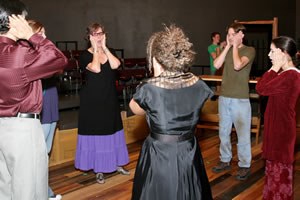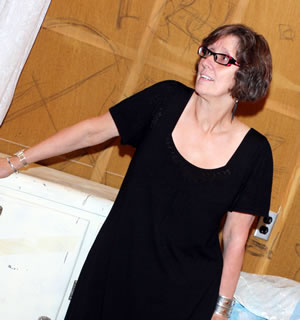Rooted in Another World
By Ashley Festa
Theatre director Robin Payne visited San Antonio for only eight weeks, but in that short time, she made a big impact on the students she was teaching.

Robin Payne, of New Zealand, teaches her UIW student actors some warm-up exercises before their dress rehearsal.
Her devotion to them is clear. At the rehearsal, the director could see that her stage manager was stressed. After a comforting hug, the two put their foreheads together and clutched each other's arms. They said nothing. After a moment, they stepped away, and the stage manager seemed calmer and more focused.
That is the kind of presence Payne, of New Zealand, brings to the theatre students at the University of the Incarnate Word. Her calm, humble manner would never reveal the fact that she has studied and trained all over the world.
Her international training and experience as a teacher- director began in Australia in the 1970s when she attended the National Institute of Dramatic Art (NIDA), where actor Mel Gibson also studied. After her studies at NIDA were complete, she worked in Australia. She went on to study in Bali, and then worked in Thailand and Russia. Later, she did her post-graduate studies at the Central School of Speech and Drama in London, a prestigious drama school whose famous students have included Sir Laurence Olivier. She later returned to Australia and worked with small aboriginal theatre companies just beginning to emerge in the 1980s. Starting in 1991, she was the director of Te Kura toi Whakaari o Aotearoa, the New Zealand Drama School. She left in 1997 to do freelance work.
With all this international experience studying and teaching, she has developed a love for bringing different cultures together.
“There are threads that are connected,” she explained. “There are ripples internationally in the theatre world.”
UIW students agree that Payne’s experience adds to theirs.
“I feel like she brings a fresh new perspective, not to mention she is respected all over the world for her work as a director,” theatre arts major Tania Hajali said. “Not all directors are the same, and it’s great for us students to work with as many directors as we can. Each one brings something new to the table. I find that in every show I've been in, I have found a piece of myself that I have not known.”
Through her studies, Payne has been surrounded by many different cultures, but she emphasizes the need to hold tight to one’s roots.
“You must know where you stand,” she said.
In New Zealand, when a person explains who he is, his name is rather unimportant, Payne said. Instead, he tells people on which canoe his ancestors arrived. Then, he tells others under which mountain he grew up, and then he says near which body of water he grew up. Through these reference points, other New Zealanders can zero in on who a person is.
It’s important to New Zealanders to stand with your land and your ancestors. “It’s wound through every fiber of your being,” Payne explained. She related the pull of the land to being similar to a tide or the pull of the moon. It’s a sentimental or geological connection, she said.
Learning about that connection is an internal journey that is particularly important for the actor, Payne said.
“You must understand where you come from, and then you can travel elsewhere,” she said. “To explore other territory, they must be secure with who they are.”
That’s exactly the reason Payne was able to venture out all over the world.

Payne was invited by UIW theatre arts professor Margaret Mitchell to direct the theatre department's spring play "Three Days of Rain."
The New Zealander found her way to UIW through Margaret Mitchell, a professor in the theatre arts department. In the early 1990s, Payne’s husband met Mitchell at the Prague Quadrennial, a huge theatre festival in the Czech Republic. Payne visited the university for the first time in 1999 for three months to put on an outdoor production of multicultural stories at the Blue Hole, the spring on campus that is the source of the San Antonio River. She continued her friendship with Mitchell, and the two have visited back and forth helping with theatre productions every few years.
This is Payne’s third trip to Texas. Mitchell asked her to direct one of the UIW theatre’s spring productions. So, Payne arrived in San Antonio from the other side of the world to spend eight weeks directing “Three Days of Rain” in April. Payne brings a different perspective to the production than many local directors could provide.
“I bring a lot of sensibility to help people view things through a different lens,” she said. She explained that the questions she asks “shine a spotlight on and light up the dusty corners” because she isn’t from the United States.
“I have a lot of tricks in my bag for helping student actors learn their craft,” she said.
Although she is proud of her education, she disconnects her ego from the quality of the show.
“My commitment is to create a fine production, but also for students to learn tools to help them. I’m much more interested in them learning” than to inflate her ego with a stunning performance, she said.
It’s not only the actors she is concerned with; she also focuses on the crew, designers and stage management. “It is hugely important to have an integrated learning experience,” she said.
Before a rehearsal the week the play opened, Payne and the group of actors were both working and having fun. During warm-up exercises, Payne had the actors stick their tongues out to immobilize them and then recite their lines. Trying to keep the giggling to a minimum, Payne explained that the exercise was a technique to loosen the tongue. The group continued with breathing and focusing exercises.
For Payne, the importance of roots is so deeply set within her that when she comes to UIW, she visits the Blue Hole and greets the source of the river.
“I feel like this is a real heart home for me. I love working here,” she said of UIW. “I come to reconnect with the spirit of this land and the heart of the people here.”
